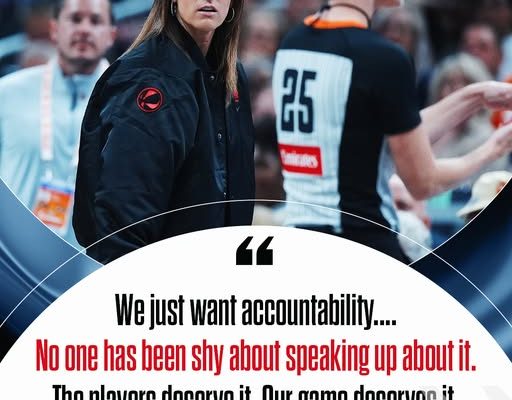**Indiana Fever HC Stephanie White Calls for Accountability on Officiating in the League**
The Indiana Fever have been at the center of multiple contentious officiating decisions this season, prompting head coach Stephanie White to voice her frustrations publicly. In a post-game press conference following a narrow loss to the Chicago Sky, White didn’t mince words, calling for greater accountability in WNBA officiating. Her comments have sparked a broader conversation about consistency, transparency, and fairness in how games are called—a debate that extends beyond just the Fever and touches on the integrity of the league as a whole.
White’s frustration stems from what she perceives as a pattern of inconsistent and, at times, unfair officiating that has disproportionately impacted her team. In the Fever’s recent matchup against the Sky, a critical no-call in the final moments of the game drew sharp criticism. Replays showed clear contact on Fever guard Kelsey Mitchell as she drove to the basket, but the officials swallowed their whistles, effectively sealing the game in Chicago’s favor.
“We’re fighting for every possession, every point, and when obvious calls are missed—especially in crucial moments—it’s disheartening,” White said. “Our players deserve better. The league needs to hold officials accountable the same way they hold players and coaches accountable.”
This isn’t the first time White has raised concerns about officiating this season. Earlier in the year, after a physical game against the Connecticut Sun, she pointed out the lack of foul calls on opposing players who were overly aggressive against Fever rookie sensation Aliyah Boston. Boston, one of the league’s most promising young stars, has frequently been subjected to heavy contact without drawing fouls, while similar physicality against established veterans often results in quick whistles.
“There’s a discrepancy in how games are called depending on who’s involved,” White noted. “If we want this league to grow, we need consistency. Young players shouldn’t have to ‘earn’ fouls by proving themselves over years. The rules should be applied the same way for everyone.”
White’s comments echo a sentiment shared by several coaches and players across the WNBA. Officiating has long been a point of contention in professional basketball, with subjective judgment calls often deciding games. However, the lack of transparency in how officials are evaluated—and the absence of public accountability for missed calls—has led to growing frustration.
Unlike the NBA, where the Last Two Minute (L2M) reports provide some insight into officiating accuracy in close games, the WNBA does not release similar detailed breakdowns. This leaves teams and fans in the dark about whether the league internally acknowledges mistakes. White’s call for accountability isn’t just about venting frustration—it’s about pushing for systemic change.
“We need more than just apologies behind closed doors,” she said. “If officials are missing calls that impact games, there should be consequences. And if certain teams or players aren’t getting the same treatment as others, the league needs to address that.”
The issue of officiating consistency isn’t unique to the Fever, but their position as a rebuilding team with a young core has made them particularly vulnerable. Established franchises with superstar players often benefit from a subconscious bias in foul calls—a phenomenon well-documented in sports psychology as the “star treatment” effect. Rookies and less prominent teams, meanwhile, frequently find themselves on the wrong end of 50-50 calls.
This dynamic has tangible consequences. Close games in the WNBA often come down to a handful of possessions, and a single missed call can swing momentum, alter outcomes, and even affect playoff seeding. For a team like the Fever, who are fighting to climb out of the league’s lower standings, these missed opportunities can stall progress and demoralize a young roster.
White’s advocacy isn’t just about her own team—it’s about fairness across the board. She has suggested that the league implement more rigorous training for officials, real-time communication between referees and the league office for critical calls, and public accountability measures similar to the NBA’s L2M reports.
“We all make mistakes,” she acknowledged. “But when mistakes keep happening in big moments without any visible effort to correct them, it hurts the credibility of the game.”
The WNBA has made significant strides in recent years in terms of visibility, player empowerment, and overall growth. However, officiating remains an area where improvement is needed. Fans, players, and coaches alike want to know that games are decided by skill and effort—not by inconsistent refereeing.
As the league continues to expand, the pressure to ensure fair and transparent officiating will only grow. Stephanie White’s outspoken stance may be the catalyst for much-needed changes. Whether the WNBA takes concrete steps toward greater accountability remains to be seen, but one thing is clear: the conversation isn’t going away.
For now, White and the Fever will keep competing, hoping that the next close game won’t be decided by a missed call. But if history is any indication, the fight for fairness in officiating is far from over.



